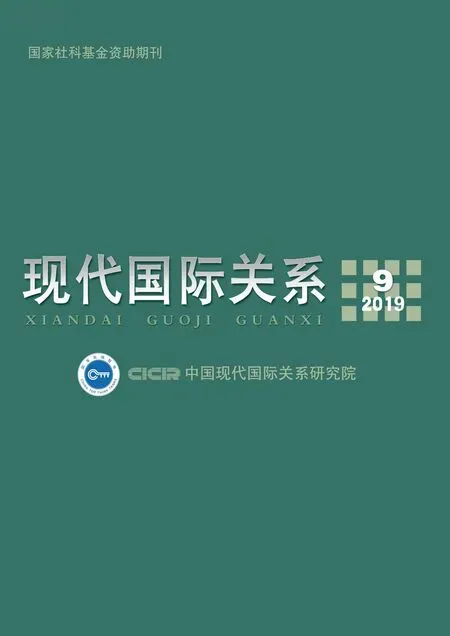英文摘要
InheritanceandInnovationofXiJinpingThoughtonDiplomacyinTheoryandPractice
QiuHuafei
Abstract: The world today is experiencing profound changes unseen in centuries, and Chinese President Xi Jinping has proposed to promote the construction of a community with a shared future for mankind and a new type of international relations featuring mutual respect, fairness, justice and win-win cooperation. This paper expounds that Xi Jinping Thought on Diplomacy is the inheritance and innovation of Marxism, Leninism, Mao Zedong Thought and Deng Xiaoping Theory etc. from three aspects: the theoretical and practical basis for the formation of Xi Jinping Thought on Diplomacy; the cultural inheritance of Xi Jinping Thought on Diplomacy Thought; and the theoretical innovation of Xi Jinping Thought on Diplomacy. It stresses that Xi Jinping Thought on Diplomacy is the product of the combination of the Marxist common principles and the specific practice of the major country diplomacy with Chinese characteristics.
Keywords: Xi Jinping, Thought on Diplomacy, theory and practice, inheritance and innovation
UKandFPDAintheHorizonof“GlobalBritain”
HuJie
Abstract: The new values of FPDA (Five Power Defense Arrangements) to UK are mainly manifested in the following aspects: FPDA will facilitate UK’s strategic extension from the Indian Ocean to the Pacific by its connection between two regions; FPDA can be a significant pivot of docking UK’s “Global Britain” with US’s “Indo-Pacific” strategy; as a mechanism guarantee, FPDA is definitely helpful for bolstering UK’s intervention in Asia-Pacific security affairs, especially the South China Sea issue; FPDA contributes greatly to defensive cooperations between UK and its allies and partners, supporting UK’s constructions of its Indo-Pacific security cooperation network. Nevertheless, FPDA will inevitably meet restrictions, such as UK’s insufficient investment in resources, FPDA’s own “collective action dilemma” in the South China Sea issue, constraints from American-led Indo-Pacific alliance system, and great differences in the security environment between the Indian Ocean and the Pacific. The future of FPDA depends fundamentally on UK’s determination, investment and strategic operations.
Keywords: “Global Britain”, UK, FPDA, Indo-Pacific, South China Sea issue
EUFragmentationandItsImpacts
HeYunandShiZhiqin
Abstract: The European Parliamentary election in May, 2019 resulted in further fragmentation in the European Union. The European People’s Party (EPP) and the Progressive Alliance of the Socialists and Democrats (S&D) lost their control of the European Parliament as they lost the majority of seats. Ideological differences between Southern and Eastern Europe versus Northern and Western Europe appear to have widened and the EPP and S&D’s votes declined in Western and Northern Europe, which is the traditional “core” of EU. Increasing fragmentation is the result of the ideological decline of the center-left and center-right parties and reflected the increasing fragmentation within EU member states. EU fragmentation will make it more difficult for EU to raise its climate ambition as well as negotiate its next multi-year budget, slow down EU’s membership expansion, make it more complicated for EU to sign further free trade agreement, and will also have implications for Sino-EU relations.
Keywords: European Parliament election, fragmentation, party group, regional differences
India-JapanMaritimeStrategicCooperationsinceModiAdministration
BaoShanliang
Abstract: Since Modi came to power, India-Japan cooperation in the maritime field has witnessed new cooperation in equipment and technology, maritime domain awareness and multilateral maritime cooperation. The combination of India’s “Act East” Policy and Japan’s “Free and Open Indo-Pacific Strategy” constitutes the basis for cooperation between the two countries; the common strategic pursuit of balancing the “China Threat” has resulted in the endogenous dynamics of the two countries’ layout of the ocean; the regional strategic adjustment of the United States creates conditions for deepening the cooperation between India and Japan; mutual help is the practical need to protect the sea lines of communication. Comprehensive analysis shows that India and Japan will continue to strengthen maritime strategic cooperation. However, differences in national conditions and systems, strategic appeal, and different considerations of national interests have caused uncertainties to the future cooperation.
Keywords: Modi administration, India-Japan maritime cooperation, prospect
NewtrendsofInternationalTerrorismandCounter-terrorism
FanJuanrong
Abstract: ISIS lost its last military stronghold Baqouz, meaning the physical form of the so-called “Terrorist State” has completely collapsed and international counter-terrorism movement has entered the era of “Post-ISIS”. However, although ISIS has been defeated, its fighters continue to act and the ideology of extremism that underlies ISIS’s insurgency continues to spread around the globe. Al-Qaeda is still a global terrorist organization that is most rampant in Somalia, Yemen and other places, and there remain many other indigenous terrorist groups that are rooted in their specific countries and these groups still wage attacks from time to time. The Christchurch mosque Shootings in New Zealand on March 15, 2019 marked a new height in the waves of the far-right terrorism in the West. The serious threat of terrorism seems incessant, and it is mainly influenced by ideology, religious conflicts, sectarian conflicts, geopolitics, super power games. International community still faces many difficulties, and the international fight against terrorism still has a long way to go.
Keywords: terrorism, ISIS, Al-Qaeda, anti-terrorism
(Edited By Zhang Yimeng)

